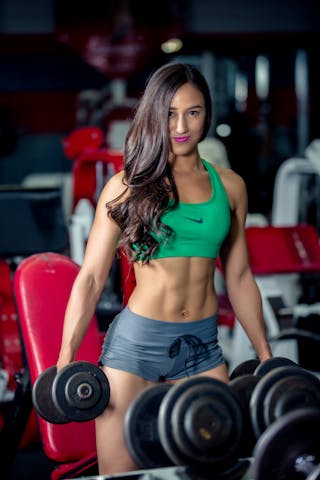Captain Marvel Director Speaks Out on Carol Danvers' Sexuality
If you're an avid fan of Captain Marvel, you've probably wondered about her love life. Well, the director has some interesting insights on the matter. It turns out that Captain Marvel's romantic relationships were a key focus for the character development. If you're curious to learn more about this topic, be sure to check out this fascinating article for more details.
The Marvel Cinematic Universe has seen its fair share of powerful female characters, and one of the most recent additions to the roster is Captain Marvel, played by the talented Brie Larson. As the director of the film, Anna Boden, has recently spoken out about the character's sexuality, it has sparked a conversation about representation and inclusivity in the superhero genre.
If you're tired of Tinder, you should try out this list of alternative dating websites to spice up your love life.
The Importance of Representation in Media
Explore the exciting world of browser-based sex games and experience new levels of fun and pleasure.
Before we dive into the specifics of Carol Danvers' sexuality, it's crucial to understand the significance of representation in media, especially when it comes to dating and relationships. When people see themselves reflected in the characters they admire on screen, it can have a profound impact on their self-esteem and sense of belonging. This is particularly true for members of the LGBTQ+ community, who have historically been underrepresented in mainstream media.
Explore the world of mature women in live chat at Granny Chat
Carol Danvers' Ambiguous Sexual Orientation
In the comics, Carol Danvers' sexual orientation has never been explicitly defined. This ambiguity has led to speculation and debate among fans about her romantic interests. While some have interpreted her relationships with other female characters as romantic in nature, others have argued that her sexuality has never been a focal point of her character development.
Anna Boden's Perspective
In a recent interview, Captain Marvel director Anna Boden addressed the issue of Carol Danvers' sexuality, stating that the character's romantic relationships were not a focus of the film. Boden emphasized the importance of portraying Carol as a multifaceted and complex character beyond her romantic interests. This approach aligns with the larger goal of the film, which is to showcase Carol's strength, resilience, and determination as a superhero.
The Impact on Dating Culture
So, what does this mean for dating culture? For one, it reinforces the idea that a person's worth is not solely determined by their romantic relationships. In a world where dating apps and social media often place a heavy emphasis on finding a partner, it's refreshing to see a character like Carol Danvers whose identity is not defined by her love life.
Furthermore, Boden's comments open up a broader conversation about the representation of LGBTQ+ characters in mainstream media. While there has been progress in recent years, there is still a long way to go in terms of inclusivity and accurate portrayal of diverse sexual orientations. By acknowledging the complexity of characters' identities and experiences, filmmakers have the opportunity to create more authentic and relatable stories for audiences of all backgrounds.
The Future of LGBTQ+ Representation in Superhero Films
As the superhero genre continues to evolve, it's clear that audiences are hungry for more diverse and inclusive storytelling. With the success of films like "Black Panther" and "Wonder Woman," there is a growing demand for representation that reflects the real world. This includes showcasing characters with diverse sexual orientations and gender identities.
Moving forward, it will be important for filmmakers and studios to engage with LGBTQ+ communities and advocates to ensure that their representation is authentic and respectful. By doing so, they can create a more inclusive and welcoming environment for all viewers, regardless of their sexual orientation.
In conclusion, the conversation surrounding Carol Danvers' sexuality serves as a reminder of the importance of representation in media. As we continue to strive for inclusivity and diversity in storytelling, it's crucial to consider the impact that these portrayals have on individuals' experiences and perceptions of themselves. With the support of filmmakers and audiences alike, we can look forward to a future where all people feel seen and valued in the media they consume.
- https://personals-website.campsupernow.com/posts/sex-swing-what-is-a-sex-swing-and-how-to-use-a-sex-swing/
- https://matchmaker-website.ua-sex.com/posts/what-does-demisexual-and-demiromantic-mean/
- https://dating-website.ua-sex.com/posts/what-to-say-when-a-friend-comes-out-as-lesbian-or-bisexual/
- https://dating-for-free.themountaintopplay.com/posts/5-facetoface-sex-positions/
- https://dating-chat-room.thehottieandthenottie.com/posts/how-dating-a-narcissist-changes-you-relationships-with-npd/
- https://hookupguide.campsupernow.com/posts/life-as-a-sexual-submissive-is-pretty-different-to-fifty-shades-of-grey/
- https://personals-website.themountaintopplay.com/posts/self-love-affirmations-in-dating/
- https://hookupguide.thehottieandthenottie.com/posts/30-breakup-texts-to-dnd-any-relationship/
- https://hookupguide.thehottieandthenottie.com/posts/would-you-try-a-sex-fast-like-kourtney/
- https://online-personals.campsupernow.com/posts/best-genderaffirming-sex-toys/
- https://datingguide.thehottieandthenottie.com/posts/life-as-a-sexual-submissive-is-pretty-different-to-fifty-shades-of-grey/
- https://sex-app.thehottieandthenottie.com/posts/how-will-dating-change-after-social-distancing/
- https://sex-app.timebombrecordings.com/posts/sexual-attraction-women-who-arent-attracted-to-their-partners/
- https://online-sex.themountaintopplay.com/posts/huge-penis-sex-with-a-big-penis-and-what-its-really-like/
